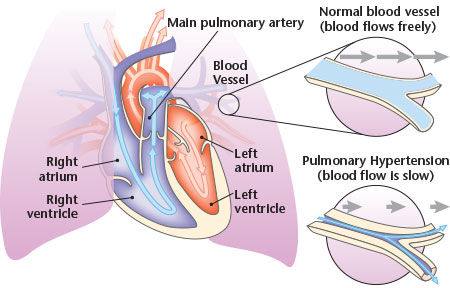
Whether you are already suffering from this disease or your doctor suspects you have it, pulmonary hypertension is a serious medical condition that can damage the right side of your heart, making it less efficient at pumping your blood around the body and getting oxygen to your muscles.
Defining Pulmonary Hypertension
Pulmonary hypertension is raised blood pressure within your pulmonary arteries. These arteries supply your lungs. This disease is a life-threatening one: it develops because the tiny pulmonary arteries become narrowed, clogged, or otherwise destroyed.
In healthy people, blood travels through the pulmonary arteries from the right-hand side of the heart, picking up oxygen along the way when it reaches the lungs. This now oxygen-rich blood returns to the left-hand side of the heart, where it is pumped throughout the body to the muscles and other areas of the body.
If you have pulmonary hypertension, your pulmonary artery walls are thickened and stiff. As a result, they're unable to expand for the blood that is passing through. You may also have blood clots that can also hinder blood flow.
This reduced blood flow results in the right-side of your heart being unable to properly pump blood through the arteries. The heart has to work harder. With this comes a rise in pressure within your pulmonary arteries.
In the event that the right-side of your heart continues to work in this compromised manner, it will become weaker and less efficient at pumping blood. This can result in heart failure.
Symptoms of Pulmonary Hypertension
It's a well-known fact that common hypertension is often known as "the silent killer". In that same guise is the equal fact that pulmonary hypertension signs and symptoms often go undetected for months and even years. When symptoms do appear, they include the following:
- Shortness of breath (also known as dyspnea) that begins during exercise and becomes progressively worse during rest
- Fatigue or extreme tiredness
- Chest pain or angina
- Feeling faint
- Leg and ankle swelling, known as edema
- Racing heartbeat, also known as tachycardia
- Dizziness
- Fainting/passing out
How do you Get Pulmonary Hypertension?
There are actually five forms of pulmonary hypertension: Group 1, Group 2, Group 3, Group 4, and Group 5. In all of these groups, the average arterial pressure is 25 mmHg or higher, whereby normal pressure is 8-20 mmHg at rest.
Each one of these groups present with various causes that range from genetics and drugs to liver and connective tissue disease.
Group 3 is associated with diseases such as COPD and interstitial lung diseases that cause lung tissue scarring as well as sleep apnea and other sleeping disorders.
Other causes of pulmonary hypertension that fall within the groups are the following:
- Autoimmune diseases like sclerodoma
- Blood clots in the lungs
- Cirrhosis of the liver
- Emphysema
- HIV
- Left-sided heart failure
- Pulmonary fibrosis
- Sickle cell anemia
Despite the fact that you suffer from pulmonary hypertension, you can still lead a productive and satisfying life. Medical advances and treatments continue, so it's important to stay up-to-date with them with your pulmonary specialist.





